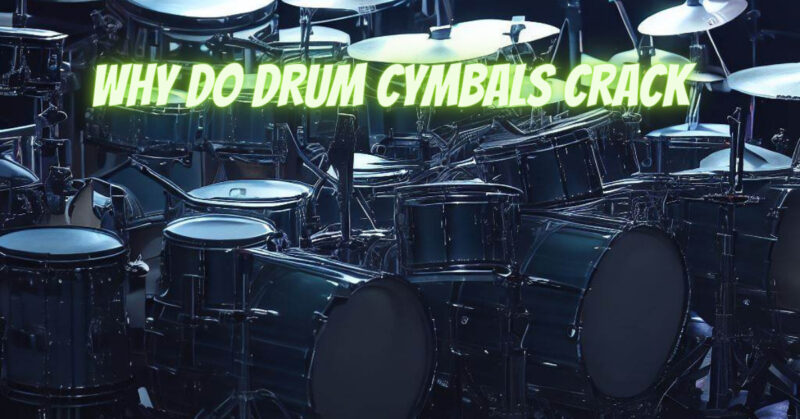Drum cymbals are vital components of a drum set, providing the shimmering and dynamic sound that adds character to the music. However, cymbals are susceptible to cracking over time, which can significantly impact their sound quality and longevity. In this article, we will explore the common reasons why drum cymbals crack and provide insights into how you can prevent such damage.
- Material Fatigue: Drum cymbals are typically made of metal alloys, such as bronze or brass. Over time, repeated stress and vibrations from striking the cymbals can lead to material fatigue. The constant bending and flexing of the metal weaken its structure, making it more prone to cracking. Cymbals that have been played extensively or subjected to heavy hits are particularly susceptible to material fatigue.
- Improper Technique: Using improper drumming techniques can contribute to cymbal cracking. Striking the cymbals too forcefully or at improper angles increases the stress on the metal, increasing the risk of cracks. It is essential to develop proper drumming technique, including striking the cymbals with the appropriate level of force and using a relaxed grip to minimize unnecessary stress.
- Overplaying: Excessive and prolonged playing without adequate rest can accelerate cymbal wear and increase the likelihood of cracks. Cymbals need time to cool down and recover their natural resonance after being struck. Regular breaks during practice sessions and performances allow the cymbals to dissipate heat and maintain their structural integrity.
- Temperature and Humidity Changes: Extreme temperature fluctuations and high humidity levels can have a detrimental effect on cymbals. Rapid changes in temperature or exposure to excessive heat can cause metal expansion and contraction, leading to stress fractures. Additionally, high humidity levels can corrode the metal over time, weakening its structure and making it more susceptible to cracking.
- Improper Storage and Handling: Improper storage and handling of cymbals can contribute to damage and cracking. Stacking or piling cymbals without proper protection can lead to scratches, dents, and cracks. When transporting cymbals, it is crucial to use padded bags or cases to provide cushioning and protect them from impacts.
Prevention Tips:
- Proper Technique and Playing: Develop and maintain proper drumming techniques, including striking the cymbals with controlled force and using appropriate angles. This reduces the stress on the cymbals and minimizes the risk of cracking.
- Regular Maintenance: Clean and maintain your cymbals regularly to remove dirt, debris, and corrosive substances. Use a soft cloth and mild cymbal cleaner to maintain their shine and prevent the buildup of harmful elements.
- Rest and Rotation: Give your cymbals regular rest periods during practice sessions and performances. Avoid continuous, excessive playing without breaks to allow the cymbals to cool down and recover their resonance.
- Environmental Considerations: Store cymbals in a controlled environment with stable temperature and humidity levels. Avoid exposing them to extreme heat or rapid temperature changes. Use protective cases or bags to prevent damage during storage and transportation.
- Quality and Careful Selection: Invest in quality cymbals that are suited to your playing style and musical needs. Consider factors such as thickness, size, and alloy composition. Handle your cymbals with care, avoiding rough handling or impacts that can contribute to cracking.
Conclusion:
Drum cymbals can crack due to various factors, including material fatigue, improper technique, overplaying, temperature and humidity changes, and improper storage and handling. By developing proper drumming techniques, giving cymbals adequate rest, maintaining a controlled environment, and handling them with care, you can minimize the risk of cracking and ensure the longevity and optimal performance of your cymbals. Regular maintenance and selecting quality cymbals suited to your playing style are also essential in preventing cracks and maintaining their sonic characteristics.


